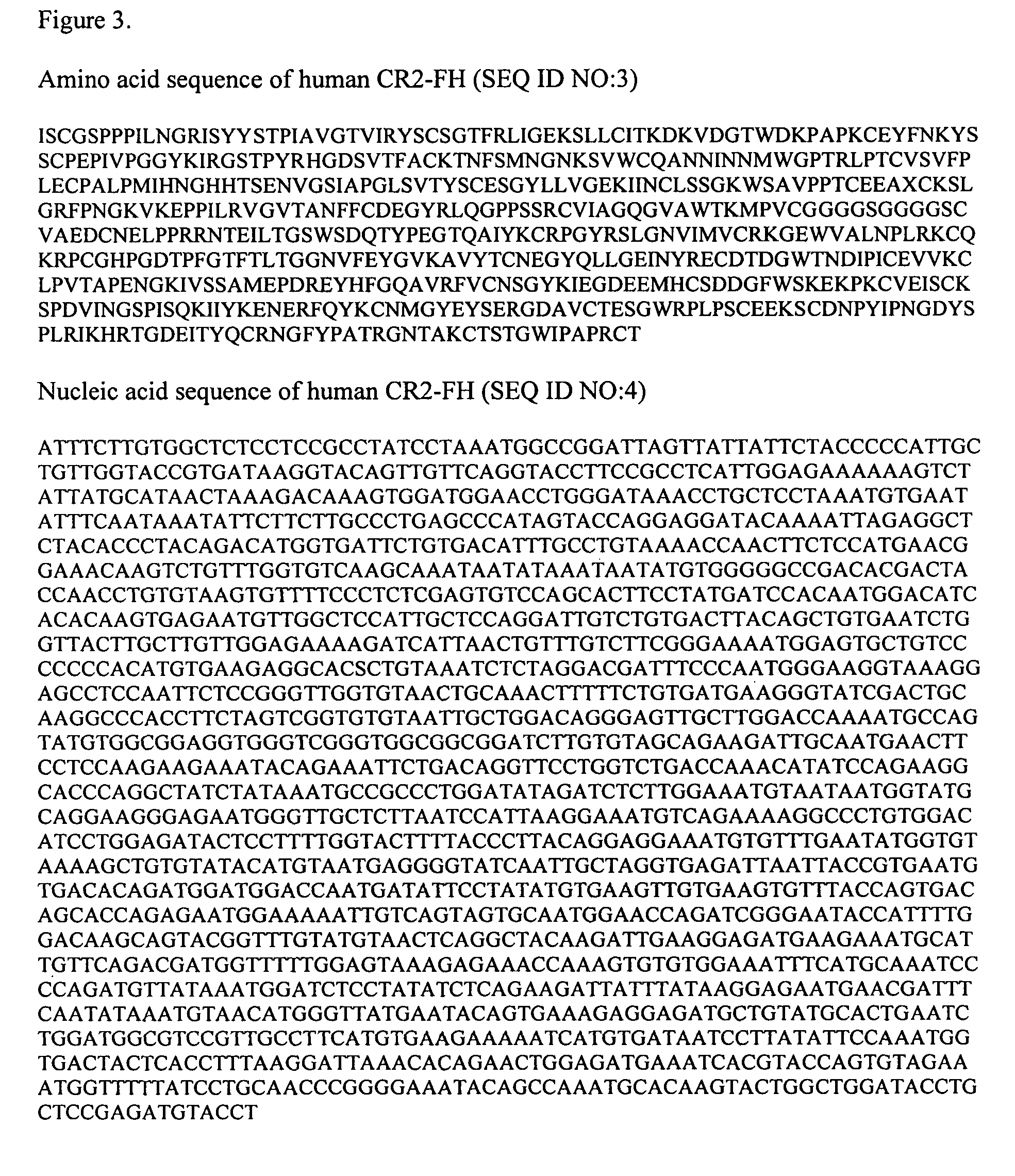Targeting complement factor H for treatment of diseases
a technology of complement factor and disease, applied in the direction of immunological disorders, drug compositions, peptides, etc., can solve the problems of tissue destruction, complement-mediated cell lysis of target structures, etc., to improve organ transplant survival, and improve the survival of organ transplant donors
- Summary
- Abstract
- Description
- Claims
- Application Information
AI Technical Summary
Benefits of technology
Problems solved by technology
Method used
Image
Examples
example 1
Exemplary Sequences of CR2-FH Molecules and Signal Peptides
[0174]FIGS. 4-6 provide exemplary amino acid sequences of CR2-FH molecules described herein (SEQ ID NOs: 5-10). “nnn” represents an optional linker.
[0175]FIG. 7 provides exemplary amino acid sequences of signaling peptides described herein (SEQ ID NOs: 11 and 13) and polynucleotides encoding the signaling peptides (SEQ ID NOs:12 and 14).
[0176]FIG. 9 provides amino acid sequence of a mouse CR2-FH fusion protein (designated as CR2-fH or CR2NLFH) (SEQ ID NO:17) and a polynucleotide that encodes a mouse CR2-FH plus the signal peptide (SEQ ID NO:18).
[0177]FIG. 10 provides the DNA sequence of CR2NLFHFH, a mouse CR2-FH fusion protein containing a CR2 portion and two FH portions without a linker sequence (SEQ ID NO:19).
[0178]FIG. 11 provides the DNA sequence of CR2LFHFH, a mouse CR2-FH fusion protein containing a CR2 portion linked to two FH portions via a linker sequence (SEQ ID NO:20).
[0179]FIG. 20 provides amino acid sequence of ...
example 2
In Vitro Inhibition of Alternative Pathway by CR2-FH
[0181]Mouse fusion proteins containing the first four SCR domains of CR2 and the first five SCR domains of FH (with linker (CR2LFH) or without linker (CR2NLFH or CR2-fH)) were made by recombinant DNA cloning and gene expression method. The sequence for one of the CR2-FH fusion proteins is provided in FIG. 9. SEQ ID NO:17 is the polypeptide sequence of the CR2-FH fusion protein. SEQ ID NO:18 is the nucleotide used to encode the fusion protein, as well as a signal peptide at the N-terminus of the signal peptide.
[0182]A mouse CR2-FH fusion protein (designated as CR2LFHFH, CR2-fH2 or CR2-fHH) containing the first four SCR domains of CR2 and two tandemly linked FH portions (each containing the first five SCR domains of FH) was also made. The CR2 portion and the first FH portion was linked by a linker sequence. The DNA sequence (including the DNA encoding the signal peptide) of CR2LFHFH is provided in FIG. 11 (SEQ ID NO:20).
[0183]In vitr...
example 3
Treatment of Intestinal Ischemia and Reperfusion Injury by CR2-FH
[0186]This experiment shows treatment of intestinal ischemia and reperfusion injury in a mouse model.
[0187]Intestinal ischemia reperfusion injury. Three adult male mice aged 8 weeks and weighing 20-25 g were anesthetized with 10 mg / kg ketamine and 6 mg / kg xylazine by i.p. injection. Animals were breathing spontaneously and body temperature was maintained using a heat mat for the entire experiment. A medial laparotomy was preformed and the intestines were carefully moved allowing access to the superior mesenteric artery. The superior mesenteric artery was clamped using a microsurgical clamp (Fine Instruments, USA). Ischemia was confirmed by palor of the small intestine. Sham treated mice underwent laparotomy without clamping of superior mesenteric artery. After 30 min. ischemia the arterial clamp was removed allowing reperfusion of the mesenteric vasculature. Animals were sutured using 6.0 ethicon suture and allowed to ...
PUM
| Property | Measurement | Unit |
|---|---|---|
| concentration | aaaaa | aaaaa |
| time | aaaaa | aaaaa |
| pH | aaaaa | aaaaa |
Abstract
Description
Claims
Application Information
 Login to View More
Login to View More - R&D
- Intellectual Property
- Life Sciences
- Materials
- Tech Scout
- Unparalleled Data Quality
- Higher Quality Content
- 60% Fewer Hallucinations
Browse by: Latest US Patents, China's latest patents, Technical Efficacy Thesaurus, Application Domain, Technology Topic, Popular Technical Reports.
© 2025 PatSnap. All rights reserved.Legal|Privacy policy|Modern Slavery Act Transparency Statement|Sitemap|About US| Contact US: help@patsnap.com



